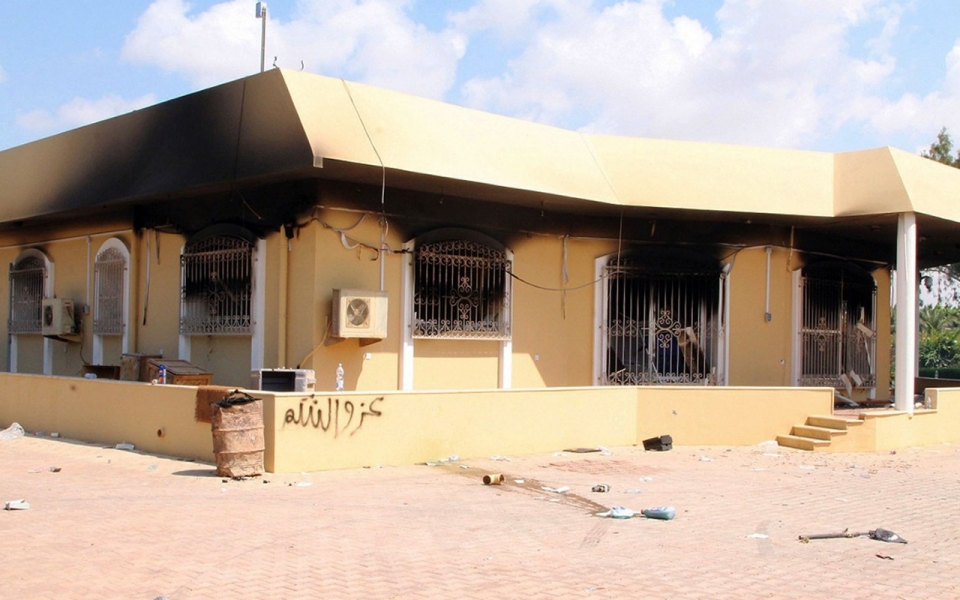
The Senate Intelligence Committee released a report Wednesday on the deadly 2012 assault on the diplomatic compound in Benghazi, Libya, laying blame on the State Department, the intelligence community and even the late Ambassador Chris Stevens — who was killed in the attack along with three others — for failing to communicate and heed warnings of hostile activity in the area.
The highly critical report said the U.S. military was not positioned to aid the Americans in need, though the head of Africa Command had offered military security teams that Stevens had rejected weeks before the incident.
The report also said that in the aftermath of the attack, U.S. analysts confused policymakers by blaming the violence on protests without enough supporting intelligence.
There was no immediate comment from the State Department.
The Benghazi attack has dogged the Obama administration because then-U.N. Ambassador Susan Rice initially blamed the violence on mob protests over an anti-Islamic film. Al-Qaeda-linked militant groups were later blamed for the strikes, first when militants overran the temporary U.S. mission on Sept. 11, 2012, and later that same night, when militants fired mortars at the nearby CIA annex where the Americans had taken shelter.
The bipartisan report may settle what has become a running political battle between many Republicans — who say the Obama administration has been covering up alleged misdeeds before, during and after the attack – and the administration, which says Republicans are on a political witch hunt.
Intelligence Committee Chairman Dianne Feinstein, D-Calif., said she hopes the report will put to rest conspiracy theories about the militant attacks that night. Georgia Republican Saxby Chambliss, vice chairman of the committee, said the report shows that despite a worsening security situation in Benghazi, the U.S. government did not do enough to prevent the attack or to protect the diplomatic facility.
"The State Department should have increased its security posture more significantly in Benghazi based on the deteriorating security situation on the ground and IC (intelligence community) threat reporting on the prior attacks against Westerners in Benghazi — including two previous incidents" at the temporary diplomatic facility that year, the report said.
It added that "tripwires" set to determine when it had become too dangerous to operate in Benghazi were crossed, but ignored, by both the U.S. and other nations.
The Defense Department had provided a site security team in Tripoli, made up of 16 special operations personnel, to provide security and other help. The State Department, according to the report, decided not to extend the team's mission in August 2012, one month before the attack. In the weeks that followed, Gen. Carter Ham, the head of Africa Command, twice asked Stevens to employ the team, and twice Stevens declined, the report said.
The report dove into the contentious talking points issued by the intelligence community after the attack that helped fuel Republican allegations of an Obama administration cover-up of militant links to the violence.
"Intelligence analysts inaccurately referred to the presence of a protest at the U.S. mission facility before the attack based on open source information and limited intelligence, but without sufficient intelligence or eyewitness statements to corroborate that assertion," the report said, adding that the U.S. intelligence community then took too long to correct the error, "which caused confusion and influenced the public statements of policymakers."
The senators also took the administration to task for failing to bring the attackers to justice more than a year after the Benghazi attack. U.S. intelligence has identified several individuals responsible, they said, but it can't track them down because of limited intelligence capabilities in the region.
White House spokesman Jay Carney said the committee report "largely reaffirms" the earlier findings from an independent panel. He said a number of the committee's security recommendations are also consistent with steps the State Department has already taken.
"This reinforces what other investigations have found, which is that there was not enough security to protect the four Americans who lost their lives," Carney told reporters traveling with President Barack Obama to North Carolina.
The committee report made 18 recommendations to improve security at diplomatic and intelligence posts overseas, including a call for the State Department to react more quickly to security threats and only in rare instances use facilities that are inadequately protected.
It also said the intelligence community should expand its mining of social media to watch for unrest, and also draw more heavily on eyewitness reporting — "especially from U.S. government personnel — in the aftermath of a crisis."
The Associated Press






Error
Sorry, your comment was not saved due to a technical problem. Please try again later or using a different browser.